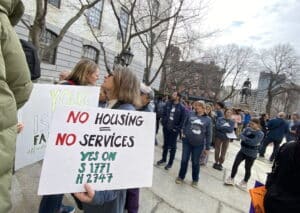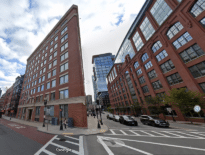
Supporters of legislation to provide a local option to impose real estate transfer fees prepare to enter the State House for a lobby day Thursday, March 23, 2023. Photo by Sam Doran | State House News Service
The Massachusetts House advanced one of the most hot-button housing policies of the session on Thursday – but only for six towns and at a session attended by fewer than 10 state representatives.
The chamber gave initial approval to a Rep. Dylan Fernandes bill (H.3804) to allow Martha’s Vineyard to impose a transfer tax on real estate transactions over $1 million. Another favorable House vote would send the bill to the Senate.
The bill would create a housing bank, run by elected representatives of each of the island’s six towns and one at-large representative, to acquire property to create year-round affordable and community housing.
It would fund the affordable housing through taxing real estate sales at 2 percent of the transaction price above $1 million. In 2023, the median sale price on Martha’s Vineyard was $1.55 million, according LINK, the multiple listing real estate service on the island.
The six towns on Martha’s Vineyard – Aquinnah, Chilmark, Edgartown, Oak Bluffs, Vineyard Haven and West Tisbury – all approved the bill locally at town meetings. The bill started moving five days after formal sessions ended, when the Revenue Committee on Aug. 5 gave it a favorable report and referred it to Committee on House Steering, Policy and Scheduling.
Fees a Big Source of Controversy
Transfer fees have been one of the most controversial topics of the 2023-2024 legislative session, when the affordable housing policy idea gained traction with a heavyweight in its corner for the first time, Gov. Maura Healey.
Healey filed her $4 billion housing bond bill last year with a provision that would have allowed all 351 cities and towns in Massachusetts decide for themselves if they wanted to impose a transfer fee on high-value real estate to pay for affordable housing, amidst a statewide crisis of both a lack of affordability and accessibility of housing units.
Western Massachusetts activists and lawmakers pushed for a reformed version of the policy that would have lowered the threshold for some lower-income municipalities, including rural towns. Boston, Cambridge and Somerville – all of whom filed home rule petitions to legalize the tax – said taxing sales between wealthy landlords profiting from the skyrocketing residential property values in their cities and using that money to help lower-income families stay in their homes or create new affordable units would help fight displacement.
Meanwhile, real estate groups lobbied against the policy, saying it would raise the costs of homeownership and could harm the troubled downtown Boston office market even further by raising another financial barrier to converting empty buildings to new uses.
Islands Advocates Argue Unique Needs
Advocates from Martha’s Vineyard and Nantucket have maintained throughout the conversation that they have a unique set of needs.
As vacation destinations, where the second home market has devastated housing opportunities for most lower-income full-time residents, activists from the islands said a transfer fee on luxury real estate is a tool that would specifically help their unique housing landscape.
“We call it the shuffle on the island. You can find a place to live from November through April, but May comes around and they want to turn it into an Airbnb, and you’re shuffled out of your house with your children,” said Dan O’Connell, former secretary of housing and economic development who now lives on Martha’s Vineyard, at a rally supporting transfer fees last year. “People have been living in tents in the summer because of the lack of being able to find housing. I don’t use the word crisis casually, but this truly is one.”
Advocates have also said that the island’s tourism industry, which relies heavily on waiters, bartenders and other part-time workers, is also suffering, as those who work on Martha’s Vineyard often cannot afford to live there.
“At the hospital a third of the physicians’ positions are open because staff who they’re trying to hire can’t find housing,” O’Connell said. “They’re providing dormitories for nurses who have come in from off the island for 48-hour shifts. It’s affecting the people we need most – farmers and fishermen, public safety officers, firefighters and EMTs who you want nearby.’
That case is true as well, and perhaps even greater on Nantucket, where the median home sale price in 2023 was over $3 million. But the House on Thursday only advanced the Martha’s Vineyard housing bank bill.
Bill’s Sponsor Faces Fall Election
The bill was filed by Fernandes with a matching piece of legislation filed by Sen. Julian Cyr in the Senate.
Fernandes is running in a competitive election this November for an open Senate seat representing the Plymouth and Barnstable district. He is the presumptive Democratic nominee, with no primary opponent, who will be up against either Republican Rep. Mathew Muratore of Plymouth, who is serving his fifth term in the House, or Kari MacRae of Bourne.
It is the second time this month that Democrats in leadership have advanced a bill whose Democrat sponsor is in a competitive election.
Healey signed a maternal health bill into law earlier this week. Its lead House negotiator was Rep. Marjorie Decker. Decker is facing a challenge from her left in a race that has gotten more media coverage in recent weeks, and an opponent, Evan MacKay, who has often pointed to Decker’s powerful committee roles and criticized Democrats’ lack of action on enacting statewide policy.
Fernandes was not available to discuss the housing bank bill on Thursday, according to his office.
The Falmouth Democrat told the Vineyard Gazette in January 2023, when he filed the bill, that he did not think just a home rule petition would succeed on its own on Beacon Hill.
“The only way we see this happening is if there’s a statewide enabling piece,” he told the Vineyard Gazette at the time. “There are towns that have been filing a transfer fee for over a decade now.”
A bill filed by Fernandes and Cyr (H.4151) to allow local transfer fees on Nantucket still sits in the Revenue Committee, past its reporting date of July 31, according to the Legislature’s website.






